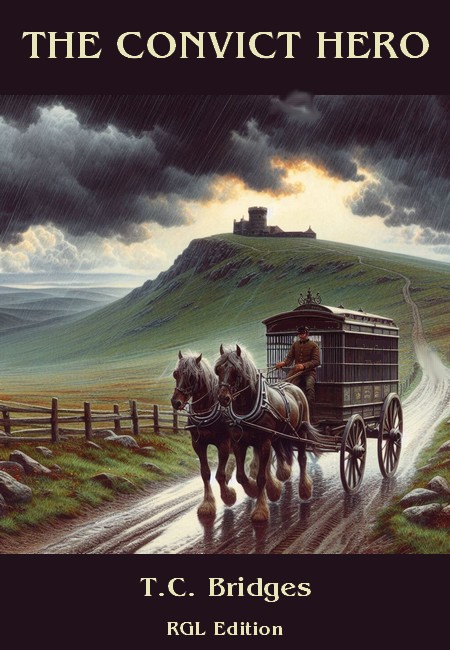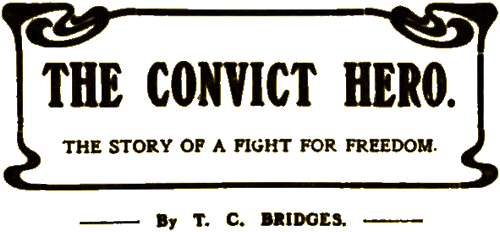
RGL e-Book Cover
Based on an image created with Microsoft Bing software
Roy Glashan's Library
Non sibi sed omnibus
Go to Home Page
This work is out of copyright in countries with a copyright
period of 70 years or less, after the year of the author's death.
If it is under copyright in your country of residence,
do not download or redistribute this file.
Original content added by RGL (e.g., introductions, notes,
RGL covers) is proprietary and protected by copyright.

RGL e-Book Cover
Based on an image created with Microsoft Bing software


TWO of the three convicts who got out of the train were evidently hardened ruffians. They boldly returned the stares of the crowd.
With the third, a much younger man, the case was plainly different. It needed only a glance to see how keenly he felt his position.
As a matter of fact, Maurice Croft had only just finished his "separates," the six months' solitary confinement which is the lot of every man sentenced to penal servitude, and this was his first appearance in public since that dreadful day when, standing in the dock at the Old Bailey, he had heard himself sentenced to five years.
Do not run away with the idea that he was innocent of the offence with which he was charged. It was the old story. Extravagant companions, living beyond his means, debt, ruin, then a foolish, desperate attempt at speculation made with his employer's money, which had ended in landing him to the dock.
Sunk in the very depths of misery, Croft followed his companions through the gate into the station square. It was an intensely hot afternoon, and the two powerful horses harnessed to the pole of the curtained wagonette, known as the prison van, were black with sweat.
Two warders had driven from the moorlands with the van. One held the reins, the other sat inside with the three convicts.
Long before they reached the top of the long, steep gradient towards the high moor, a low mutter of distant thunder was heard, and presently the blazing glare of sunshine changed to a sultry shadow. The breeze died away utterly, and the heat became almost intolerable.
"Shove 'em along as fast as you can, Yates," said Tallet, the warder inside the wagonette, to the one who was driving. "We'll have a pretty rough time of it if we get caught up on the top here."
"I can't do any more with 'em," returned Yates.
The thunder grew louder, and presently the increasing darkness was stabbed by a streak of violet fire. The horses pricked their ears uneasily. Another minute, and out of the north-west came soughing a strong gust of hot wind.
The wagonette had just topped the rise, when the storm burst in all its fury. The wind was terrific.
Then down came the rain is solid sheets. It literally foamed off the road, while through the roaring dusk the lightning flashed in a bewildering blaze of light. The terrified horses plunged frantically and pulled fiercely. The wagonette made a wild plunge forward, and a yell of terror from the two old lags announced that the horses were running away.
Next moment came the crash. The off front wheel struck the low parapet of the bridge. Croft felt himself flying through the air. Then a heavy thud, and for the moment he knew no more.
"'Urry up, Pratt; if you don't I'll leave you; take my oath I will." Royd's voice came dimly to Croft's ears, and he opened his eyes. It was still streaming rain, and there was a low roaring close by, which he presently realized was the brook coming down in furious spate.
He himself was lying below the bridge at the very edge of the peat-brown torrent—so near, indeed, that one leg was actually in the water. The two old lags were just above him.
Between the two was one of the warders, Tallet, apparently stripped to his underclothes. He was insensible, if not even dead. Of Yates there was no sign at all.
The undersized Pratt had already got on Tallot's trousers, and was in the act of pulling on the warder's coat.
"Go on an' leave me if you like," snarled back Pratt. "Lot o' good you'll do by yourself, you silly fat 'ead!"
"That's becos you've took the clothes," returned Royd, in an injured tone.
"In course I 'ave. Why didn't you catch 'old of Yates afore he went down the river? Hallo, there's the solemn-faced beggar woke up!"—as he caught sight of Croft's open eyes. "Be you coming along with us?"
Croft scrambled quickly to his feet, and found that beyond a slight dizziness and several bad bruises, he was none the worse for his fall.
"What are you going to do?" he asked eagerly.
"Going for a short 'oliday, my lad," replied Pratt, with a hideous grin. "An' look 'ere"—this with sudden ferocity—"if you're coming along you've got to do just as I say, mark that!"
He turned and scrambled up the bank. Royd followed, and Croft come later.
"Look 'ere, Pratt," said Boyd. "Taint no good my messing about in these 'ere things, I got to get some clothes."
"Well, you won't get 'em here," retorted Pratt.
For the next half-hour the three jogged sharply down the brook side, through the pouring rain. Then Pratt, who was leading, suddenly pulled up.
"Hallo, 'ere's a 'ouse!" he muttered, pointing to a small, square budding. "Now, then, Royd, 'ere's your chance for a change o' kit."
"I ain't going in these 'ere things," declared Royd. "You go first, Pratt, and take a look rahnd."
"Skeered, are ye?" sneered Pratt, "Orl right, I'll go."
He glided away, a grotesque figure. Croft saw him disappear through the trees in the direction of the house.
"'E's a wonner, is Pratt," said Royd, in tones of reluctant admiration.
They had not to wait long. In less than five minutes Pratt was back.
"Right-ho!" he muttered. "There's no one but an old chap an' a women, an' they didn't see me. We've only got to help ourselves."
Croft was at the door of the cottage before he realised that what he was engaged upon was burglary with violence. A shudder of shame seized him, but it was too late for useful repentance.
As Pratt flung open the door, an old man who was sitting in the chimney corner reading a newspaper rose stiffly to his feet. At the same time an elderly, grey haired woman, who was washing up some crockery, gave a scream.
"Shut that!" cried Pratt.
"Nah, then," went on the little ruffian, turning to the old man, who stood staring helplessly. "Fust thing we wants is some grub, next some clothes, an' arter that any money as you've got in the house; see?"
Without waiting for an answer he turned to Royd.
"You stay 'ere an' keep an eye on 'em, an' I'll go upstairs an' see what I can find. You"—turning to Croft—"stick by the door an', keep a lookout for anyone coming."
Croft, grateful to get away from the accusing eye of the woman, took his post by the door. Pratt ran upstairs. Croft could hear him plainly, tramping about overhead, and roughly throwing things about. Inside the living-room the old man had sunk back into his chair; the woman, in obedience to Royd's rough orders, had put on the table bread, cold bacon, and cider which Royd attacked with a skilly-bred appetite.
In about five minutes Pratt came down again, with a bundle of clothes over his arm and a scowl on his face.
"'Ere's some old duds!" he growled, flinging them on the table. "But there ain't a penny in money. An' money's what we've got to 'ave. 'Ere, you old loony, turning to the old man. "where d'ye keep your cash?"
"There's no money in the house."
"That be 'anged for a yarn!" retorted Pratt. "You've a stocking-full 'idden somewheres."
"I tell you we haven't got no money," replied the old man stubbornly.
"An' I ain't got no time to waste!" cried Pratt, with sudden fury. "If you don't fork out mighty sharp I'll find means to make you!"
For the third time came the reply:
"You can look if you likes; there ain't no money here!"
Obedient to command, Royd jumped up and roughly seized the old man.
"Bring 'im across 'ere to the fire. We'll make him talk fast enough, said Pratt. His face was like a fiend's.
At this the woman, who had stood gazing in petrified horror, sprang forward.
"You wouldn't hurt him!" she screamed imploringly.
For answer, Pratt struck at her savagely with the poker.
"Now 'elp me to roast the old miser!" said Pratt to Royd.
"Drop him, you brutes!" The cry came from Croft. He had been right outside when Pratt came down, but the woman scream had brought him back into the room.
His face was white with anger. Pratt stared at him for a second in perfectly genuine surprise.
"Blowed if 'e ain't gone balmy!" he remarked.
"Drop him, I tell you!" repeated Croft.
Then Pratt realised that he meant what he said, and sprang for the poker, which he had flung down on the floor. Croft saw what he was after, and made a simultaneous dash for the weapon. The two met half-way, butting like two bulls. Croft's weight sent Pratt over, and in an instant Croft and he were rolling on the flagged floor.
"'Elp, Royd! 'Elp! 'It 'im, you fool!" shrieked Pratt. Croft heard him, and cunningly swung the smaller man on top of himself.
Royd had dropped the old man, and with the poker in his hand was lumbering round making clumsy efforts to get at Croft's head.
"Steady, you fool!" gasped Pratt. "I've got 'im."
So he had. Croft's face was turning blue. Fight as he might, he could not shake off that deadly grip on his throat.
Crash! The door burst wide open. Confused tramplings and shoutings came dimly to Croft's ears.
He felt Pratt pulled roughly off him; dimly he recognised the dark blue uniform and peaked cap of a warder. Two other prison officers were in the room. Then he heard someone exclaim in astonished tones:
"This is a rum go. Blowed if they ain't fighting among themselves!"
"Fighting!" came another voice from behind. It was the woman, who had struggled to her feet. "Fighting to save us from those two brutes, warder. The young fellow may be a convict, but he's a hero."
And that was how Maurice Croft came to receive two years' remission of his sentence. To-day, through the influence of those who admired his pluck, he is working hard and doing well in a land across the seas.
Roy Glashan's Library
Non sibi sed omnibus
Go to Home Page
This work is out of copyright in countries with a copyright
period of 70 years or less, after the year of the author's death.
If it is under copyright in your country of residence,
do not download or redistribute this file.
Original content added by RGL (e.g., introductions, notes,
RGL covers) is proprietary and protected by copyright.